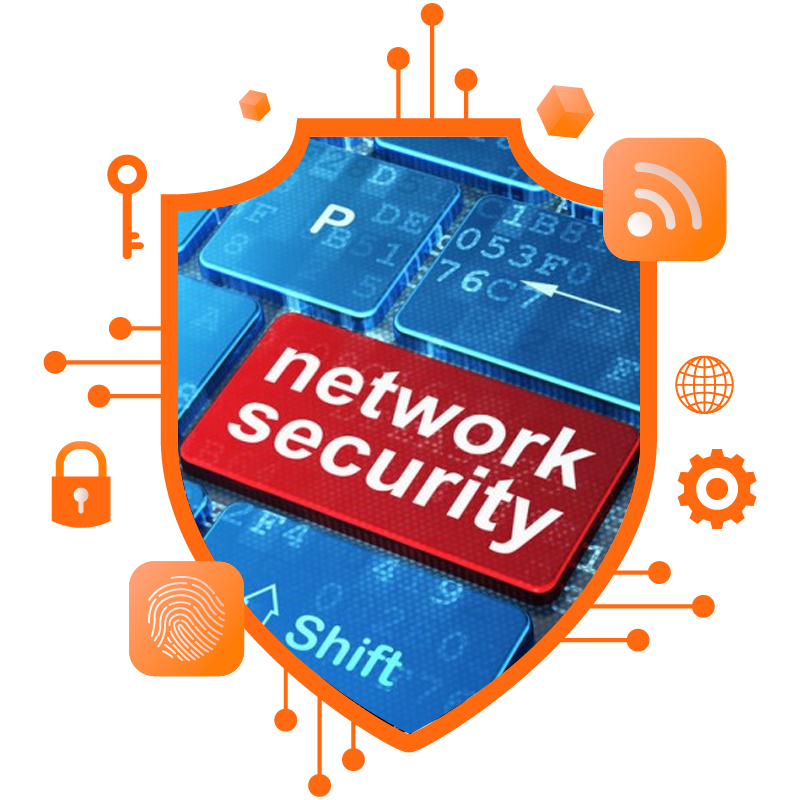Network Security
Let us keep your network protected.
You shouldn’t have to stress over the threats of cyber attacks. Focus on your core business while we safeguard and monitor your network around the clock.

Network Security
Is your network secure against cyber threats?
Network security is the cornerstone of safeguarding digital assets in our interconnected world. It encompasses a suite of strategies and technologies aimed at protecting computer networks from unauthorized access, cyber threats, and potential data breaches. Essential for businesses, network security ensures the confidentiality, integrity, and accessibility of sensitive information by deploying robust defenses against common threats such as malware, phishing attacks, ransomware, and Distributed Denial of Service (DDoS) attacks.
Consistent vigilance, regular updates, and proactive measures, including employee education, collectively contribute to maintaining a secure and resilient network infrastructure.

Malware Infection
Malware is intentionally malicious software, increasingly employed by professional cyber criminals, including organized crime and nation-state agents. It targets government, corporate, and individuals for data theft or operational disruption.

Zero Day
Cyber threats evolve with hackers concealing malware in emails, websites, and downloads. They exploit known vulnerabilities, making malware unrecognizable to bypass traditional security, aiming to steal crucial data undetected.

Browser Exploits
Exploits are often the first step in attacks that target system vulnerabilities. What’s alarming is their capacity to compromise users simply by visiting legitimate websites without and downloads. simply by visiting legitimate websites. This makes them a stealthy and potent threat vector.

Identity Theft
Cybercriminals employ phishing sites to collect sensitive data with the intent to harm individuals like bank customers or launch subsequent attacks such as obtaining administrator credentials for further exploitation.

Command And Control
A bot is malicious software enabling cybercriminals to remotely control computers for illicit actions like data theft, spam dissemination, and malware distribution. The final stage involves command and control sites for remote malware administration.

Anonymizer Usage
Anonymizers conceal online activity and suggest coordinated campaigns. Attackers use encrypted communication channels, and vital attack tools are found on Dark Web marketplaces accessible only via anonymizers.

Data Leakage
Data leakage is user-driven transfer of sensitive corporate information, whereas exfiltration is external parties deliberately extracting such data. These actions risk data loss, regulatory violations, and mark security breach conclusions.

Employees / Employee Training
Employee cybersecurity training instills practices like recognizing phishing, using strong passwords, and staying updated on software to create a secure work environment.
Ransomware
Ransomware is malicious software that encrypts files and demands payment for their release. It spreads through emails or website and causes data loss and financial harm. Prevention measures like backups and security software are crucial defenses.


What you can do
Avoiding Attacks & Vulnerabilities Requires a Multilayered Strategy
As a managed service security provider (MSSP), EK3 has partnered with the world leaders in data protection to offer our customers the best in data protection.


Secure Your Network

Enhance Authentication Security
Regular System Updates and Patching
Implement Firewalls and Intrusion Detection Systems
Encrypt Sensitive Data
Conduct Routine Security Audits
Employee Education and Training


Monitor Your Network
Real-time Network Monitoring
Traffic Analysis and Anomaly Detection
Event Logging and Analysis
Intrusion Detection and Prevention Systems
Continuous Vulnerability Scanning
Performance Monitoring and Optimization

Our Partners
We Partner With Leaders in Cybersecurity





FAQ
Frequently Asked Questions

What is network security, and why is it crucial for businesses?
Network security is a set of measures and practices designed to protect computer networks, systems, and data from unauthorized access, cyberattacks, and data breaches. It is crucial for businesses to safeguard their networks as it ensures the confidentiality, integrity, and availability of sensitive information. Without robust network security, organizations are vulnerable to various cyber threats that can lead to data loss, financial losses, and damage to their reputation.
What are some common threats that businesses face in terms of network security?
Businesses face a range of threats to their network security, including malware, phishing attacks, ransomware, and DDoS (Distributed Denial of Service) attacks. Malware, such as viruses and spyware, can compromise the integrity of data, while phishing attacks aim to trick individuals into revealing sensitive information. Ransomware can encrypt files and demand payment for their release, and DDoS attacks disrupt services by overwhelming a network with excessive traffic. Implementing effective network security measures is essential to mitigate these threats.
How can businesses ensure the security of their wireless networks?
Securing wireless networks is crucial for preventing unauthorized access. Businesses should implement strong encryption protocols such as WPA3 use complex passwords for Wi-Fi access, and regularly update router firmware to address vulnerabilities. Additionally, enabling network segmentation and implementing access controls ensure that even if an unauthorized user gains access, they have limited reach within the network. Regular monitoring and auditing of wireless network activity contribute to maintaining a secure environment.
What role do employee training and awareness play in network security?
Employee training and awareness are integral components of a robust network security strategy. Human error is a common cause of security breaches, so educating employees about phishing schemes, social engineering tactics, and the importance of strong password practices is crucial. Regular training sessions and awareness programs empower employees to recognize and report potential security threats thereby fostering a security-conscious culture within the organization. This proactive approach significantly enhances the overall effectiveness of a business’s network security measures.

Contact Us
Contact Us Form

